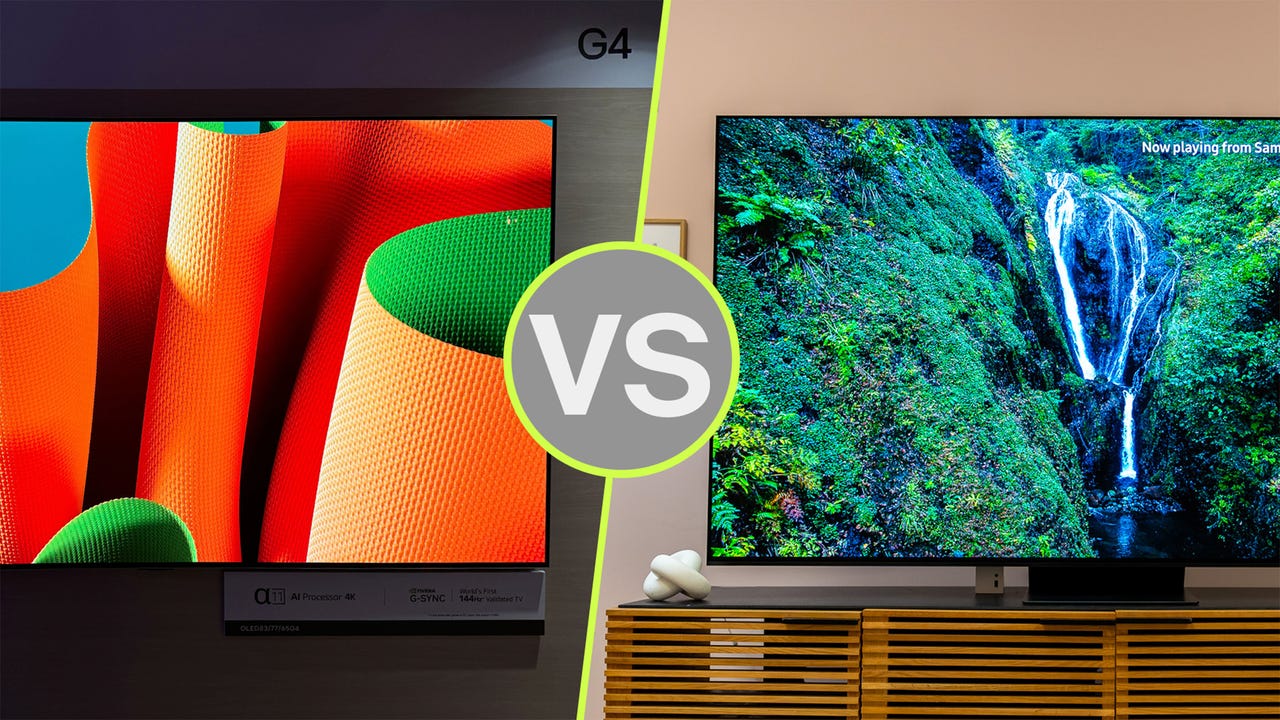
































Over the past several years, LG has emerged as one of the top names in OLED TVs, and that's been true again this year as the G4 series turned heads at CES. At the same time, Samsung has also made quite a name in the OLED space, consistently topping lists of the best OLED TVs.
Two of the most exciting offerings from these companies for 2024 are theG4 from LG and theS95D from Samsung , both of which fall under each brand's premium lines and follow very highly acclaimed versions from last year. If you're trying to choose between the two, get ready for some decision-making because it won't be easy.
Also: LG vs Samsung TV: Which brand should you buy in 2024?
Visually, both of these are stunning TVs. If you're trying to choose which one just looks the best, it's a nearly impossible task as you'll be more than happy with either. Likewise, both have enough features to keep movie lovers, streaming bingers, and gamers happy, as these are very versatile sets with high enough refresh rates.
Fortunately, there are enough differences between the two when it comes to smaller things, so it all boils down to your needs. Here's the breakdown.
LG G4 OLED | Samsung S95D | |
| Display size | 55", 65", 77", 83", 97" | 55", 65", 77" |
Chip | Alpha 11 | Neo Quantum 4K AI Gen 2 |
| Refresh rate | 144 Hz | 144 Hz |
HDMI ports | 4 (all HDMI 2.1) | 4 (all HDMI 2.1) |
| Audio | Virtual 11.1.2 channel with AI Sound Pro | 4.2.2 |
| Price | $2,600 -$25,000 | $2,599 -$4,599 |
Both the G4 and the S95D come in 77" sizes, fairly large televisions. But if you're looking for bigger, that's where Samsung stops. LG keeps the G4 going to an 83" screen and then to a massive 97" size.
Of course, the latter comes with an equally massive price tag of$25,000. Just for comparison, the 77" G4 and the 77" S95D come in at an equal price of$4,599. The S95D and the G4 both have sizes that are enough for the vast majority of people. But if you want that extra eye-popping size and/or have a wider space to fill, the G4 is the clear winner.
While both of these sets have audio that's good enough to stand on its own with no sound bar, especially with the new AI-enhanced sound features, 's initial tests at CES and other briefings point to the LG performing better. Of course, if you plan on using a sound bar, the built-in audio specs don't matter as much.
Also: LG fixes webOS security flaws that could let attackers remotely gain root access
Not only does the LG G4 have a virtual 11.1.2 channel setup, but there's a new voice remastering feature that enhances dialogue among other additions. The S95D is still perfectly fine for most people and Samsung's object-tracking sound system is a great feature that adds a level of depth to videos, but the G4 wins on built-on audio.
This one isn't for the video purist, but if you're interested in letting AI do its thing to make your content look better, you'll want the LG G4. It's the first LG TV to use AI Picture Pro processing on any source, including 4K Blu-ray. If you're not familiar, the AI processor analyzes what's being shown on the screen and adjusts the picture and sound accordingly.
Whether you're watching live sports, cartoons, or a dimly lit horror movie, it's going to have improved color. Some people won't want anything to do with AI processing and prefer a more natural look, but if you don't mind having your viewing and listening experience automatically optimized, the G4 will deliver.
At nearly 1,800 nits, the S95D is already plenty bright as far as OLED TVs go, making it ideal for most environments and lighting conditions. But this set adds on an OLED Glare-Free technology that's something to behold. While OLED sets notoriously struggle with glare in rooms with harsh lighting, the S95D's anti-glare technology makes that a non-factor.
Also: Samsung's S95D OLED is the best TV of CES 2024 and best in the world right now
For anyone skeptical, 's Jason Hiner got up close and personal with the model recently and noted, "(While) it sounds like a matte screen will lose the pop of the colors, seeing is believing and when people get a look at the S95D's screen, I'm confident most of them with enjoy not seeing the glare from other objects in the room and will be plenty happy with the brightness of the colors."
Samsung claims that this has no effect on picture quality or viewing angle. If your living room has a lot of natural light or your room lighting causes glare, you want the S95D.
Neither of these are bulky sets, but at just under 11mm, the S95D is notably thinner. If you mount this set on a wall (a set like this really is intended to be on a wall, but it does come with a stand), it fits almost totally flush. If you use it on a stand, it's sleek enough to blend in anywhere.
The slim size is largely because of Samsung's One Connect box, which minimizes the number of inputs and cables dangling from the back of your set. A single cable runs into the TV that delivers power, audio, and video data, and your inputs are connected to a box on the other end. For an eye-catching, thin set, go with the Samsung.
 Hot Tags :
Home & Office
Home Entertainment
TVs
Hot Tags :
Home & Office
Home Entertainment
TVs